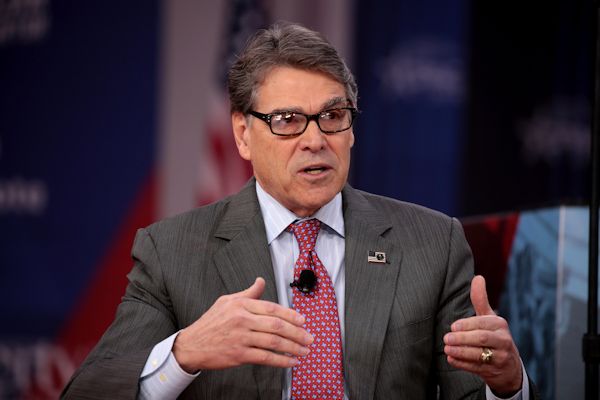SEJournal Online is the digital news magazine of the Society of Environmental Journalists. Learn more about SEJournal Online, including submission, subscription and advertising information.
 |
| Whistleblowers have played a role in the resignations of several agency heads on the environment during the past several years. Now, even Energy Secretary Rick Perry (above, in 2018) has come under scrutiny. Photo: Gage Skidmore, Flickr Creative Commons. Click to enlarge. |
Reporter’s Toolbox: Turning Whistleblowers Into Headlines Takes Skill, Patience, Luck
By Joseph A. Davis
As recent events in the nation’s capital make clear, whistleblowers sometimes make news. And they do so even in the environment and energy fields.
So today more than ever, knowing how to care for and handle a whistleblower is a key journalistic skill.
Right now, the story of the Trump Ukraine whistleblower(s) is atop the headlines. The story is so important that it could end up being the basis for impeachment of a president.
The story also illustrates the strong political forces often seeking to expose, discredit and retaliate against whistleblowers … and the need to protect whistleblowers against exposure and retaliation.
So let’s start there: Journalistic ethics require the protection of whistleblowers. You may think of a whistleblower (should you be lucky enough to meet one) as “your” source. No. They are a national treasure, and a public resource you must protect.
Whistleblowers can bring concealed misdeeds to light
Whistleblowing on the environment and energy beat isn’t always done by government employees. Sometimes it is done by employees of companies or government agencies that are breaking pollution or conservation laws. Sometimes it is done by people embedded in non-governmental organizations.
On the environmental beat, whistleblowers have
played a role in bringing concealed misdeeds
to media — and public — attention.
During the past three years, which have seen the resignation under scandal of several agency heads on the environmental beat, whistleblowers have played a role in bringing concealed misdeeds to media — and public — attention. Now, even Energy Secretary Rick Perry (subscription required) has come under scrutiny in the Ukraine scandal.
Whistleblowers are to some extent protected by federal whistleblower laws. But Congress, in writing the nation’s environmental laws over the past half-century, expected abuse would happen and wrote some whistleblower protections into at least half a dozen environmental statutes.
Advice on making the most of whistleblowers
- You are likeliest to be found by a whistleblower if you have a track record of doing tough investigative stories that expose agency or industry hanky-panky. Do that.
- Get to know agency people in non-whistleblowing contexts first. Go to meetings and schmooze. Make friends. Keep confidences. Build trust over time.
- Understand your whistleblower’s motives. Do not assume that they are pure.
- Verify what your whistleblower tells you. In multiple ways. Often, documents are the best way to do this.
- Sometimes the best sources are the ones that don’t have to be identified. Can you get the same information with a Freedom of Information request? Can you do that without identifying your original source?
- Do not mess with classified information unless you are playing at the highest level. The people whose profession it is to find classified leakers are probably more skilled than you … and they have subpoena power.
- Sometimes the low-tech tradecraft is the safest. Phones and emails, even encrypted, can be tracked. Meet at a lunch counter and pass a plain brown envelope.
- Don’t think whistleblower laws will protect your whistleblower.
- The safest and most talkative whistleblowers may be the ones who have already quit.
Reporting resources
- Government Accountability Project: One of the older and more responsible whistleblower organizations, with an environmental component. Gives legal aid to whistleblowers.
- Agency Inspectors General: IGs are supposed to be independent watchdogs that look into whistleblower complaints. Sometimes they are — it varies by agency. If an IG opens an investigation, and you find out about it, you may have something to look into (IG at U.S. Environmental Protection Agency; IG at Department of Interior).
- Agency-Specific Whistleblower Groups: These offer legal aid and issue advocacy in representation of whistleblowers. Examples: Public Employees for Environmental Responsibility, Forest Service Employees for Environmental Ethics and Coalition To Protect America’s National Parks.
- National Whistleblower Center: Supports whistleblowers, especially on national security.
- Whistleblowers of America: Another whistleblower support group. It offers peer-to-peer mentoring.
- Ex-Employee Groups: They often know where the bodies are buried. They are fairly immune from retaliation. They know people inside. Examples are EPA Alumni Association and Environmental Data and Governance Initiative.
- Employee Unions: Union reps often hear complaints from inside, and they are somewhat protected in talking to news media.
- SEJ WatchDog: “Working with Leaks and Whistleblowers, Part One,” “Leaker’s Guide, Part Two — What’s Legal, What’s Not?” and “Leaker’s Guide for EPA and Other Agencies.”
Joseph A. Davis is a freelance writer/editor in Washington, D.C. who has been writing about the environment since 1976. He writes SEJournal Online's TipSheet and Reporter's Toolbox columns. Davis also directs SEJ's WatchDog Project and writes WatchDog Tipsheet, and compiles SEJ's daily news headlines, EJToday.
* From the weekly news magazine SEJournal Online, Vol. 4, No. 37. Content from each new issue of SEJournal Online is available to the public via the SEJournal Online main page. Subscribe to the e-newsletter here. And see past issues of the SEJournal archived here.










 Advertisement
Advertisement 


